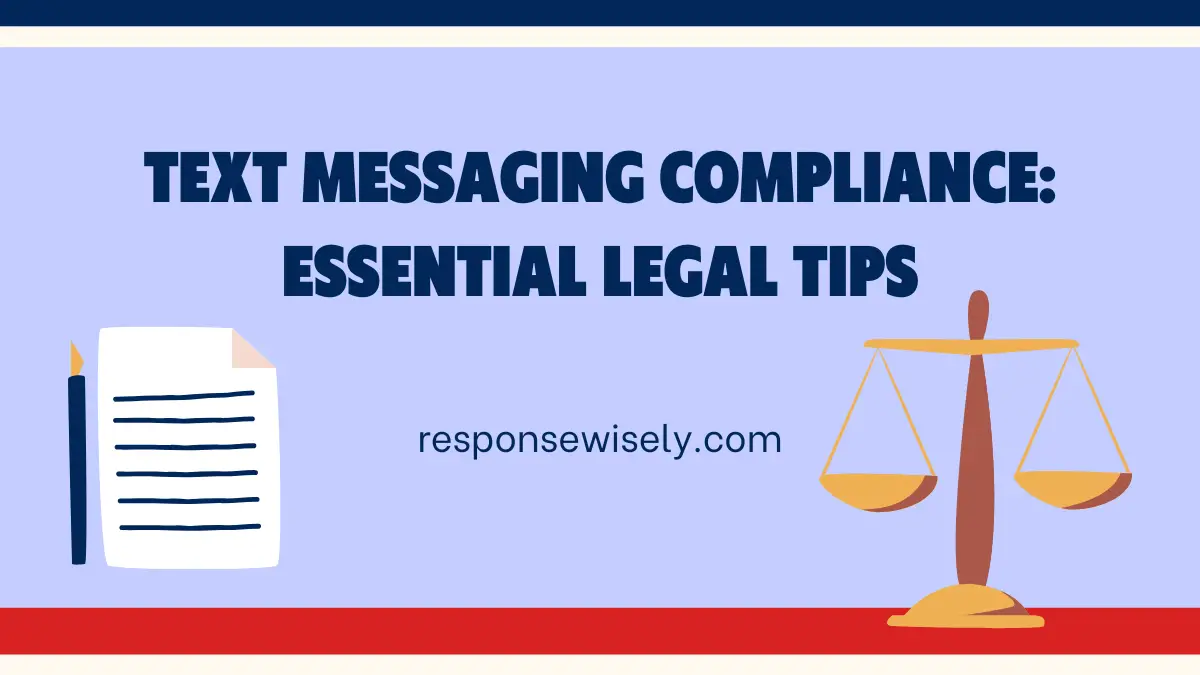Exploring SMS compliance can be a tricky terrain for businesses venturing into text messaging marketing. As a seasoned expert in the field, I understand the importance of staying abreast of legal considerations to avoid potential pitfalls.
Ensuring that your text messaging campaigns comply with regulations is not just about avoiding fines; it’s about building trust with your audience. In this text, I’ll share my insights on the key legal considerations that businesses need to keep in mind when engaging in SMS marketing.
From understanding TCPA guidelines to obtaining proper consent, I’ll provide you with practical tips and strategies to navigate the complex world of SMS compliance. Stay tuned to learn how you can leverage text messaging effectively while staying on the right side of the law.
Understanding SMS Compliance
Importance of Compliance
I always emphasize how crucial SMS compliance is for businesses. It’s not just about following regulations; it’s about building trust with your audience. By adhering to SMS compliance, you not only avoid fines but also show your commitment to ethical marketing practices.
Legal Framework for Text Messaging
Exploring the legal framework of text messaging can be daunting. Understanding TCPA guidelines and how to obtain consent are essential. These are the foundation on which SMS compliance stands. Remember, ignorance is not an excuse – staying informed is key.
Key Regulations to Consider
TCPA Regulations
When it comes to SMS compliance, one of the fundamental regulations to understand is the Telephone Consumer Protection Act (TCPA). TCPA compliance is essential for businesses engaging in text messaging marketing, as it outlines rules for sending marketing messages, obtaining consent, and honoring opt-out requests.
CTIA Guidelines
Plus to TCPA regulations, businesses need to be familiar with the Cellular Telecommunications Industry Association (CTIA) guidelines. These guidelines provide best practices for SMS marketing, including details on message content, frequency, and opt-in procedures. Adhering to CTIA guidelines can help businesses maintain a positive reputation and build trust with their audience.
Ensuring Compliance in Text Messaging
Obtaining Consent
In SMS marketing, Obtaining Consent is non-negotiable. It’s essential to have explicit permission from recipients before sending them promotional messages. This consent should be voluntary, clear, and documented to avoid any legal issues down the road.
Providing Opt-out Options
Providing Opt-out Options is another crucial aspect of SMS compliance. People should have the freedom to unsubscribe from receiving messages at any time. Including clear instructions on how to opt out in every text can help businesses maintain compliance and build trust with their audience.
I am here to guide you through these critical steps in SMS compliance.
Best Practices for SMS Compliance
Content Guidelines
When it comes to Content Guidelines for SMS compliance, it’s crucial to provide clear and accurate information to recipients. Ensure that your messages include identification of your business, a clear opt-out option, and concise, relevant content. Avoid using misleading or deceptive language, and always respect recipient consent.
Data Security Measures
Implementing Data Security Measures is essential to maintain SMS compliance. Safeguard personal information and ensure secure storage of recipient data. Regularly audit and update security protocols to protect against data breaches. Remember, privacy is paramount in SMS marketing.
| Data Security Statistics |
|---|
| 60% of small companies go out of business within 6 months of a cyber-attack |
| 46% of all data breaches are caused by employee negligence or system glitches |
Key Takeaways
- Understanding and adhering to SMS compliance is crucial for businesses, not only to avoid fines but also to build trust with their audience.
- Familiarize yourself with key regulations like the Telephone Consumer Protection Act (TCPA) and CTIA guidelines to ensure compliance in text messaging marketing.
- Obtaining explicit consent from recipients and providing clear opt-out options are non-negotiable steps in SMS compliance.
- Implement best practices such as following content guidelines, including business identification, clear opt-out options, and relevant content to maintain compliance and respect recipient consent.
- Prioritize data security measures to safeguard personal information, regularly update security protocols, and protect against data breaches, as privacy is paramount in SMS marketing.
Conclusion
Exploring SMS compliance is crucial for successful text messaging marketing. By prioritizing consent, opt-out options, content guidelines, and data security, businesses can build trust with their audience and avoid legal pitfalls. Clear and accurate messaging, including business identification and opt-out mechanisms, is key to maintaining transparency. Implementing robust data security measures is essential in safeguarding recipient information from cyber threats. Regular audits and updates to security protocols are recommended to uphold data privacy standards. By adhering to SMS compliance regulations, businesses can enhance their marketing strategies while respecting consumer rights and protecting sensitive data.
Frequently Asked Questions
Why is SMS compliance crucial in text messaging marketing?
SMS compliance is essential to ensure legal and ethical practices in text messaging marketing. It involves obtaining consent from recipients, providing opt-out options, following content guidelines, and implementing data security measures to protect recipient information.
What information should text messages contain to comply with SMS regulations?
Text messages should include clear business identification, opt-out instructions, and accurate content to adhere to SMS regulations. Avoid using deceptive language and ensure that messages provide value to recipients while maintaining transparency.
How important are data security measures in SMS marketing?
Data security measures are critical in SMS marketing to protect recipient data from cyber-attacks and data breaches. Regular audits and updates to security protocols help maintain the integrity and privacy of recipient information.

